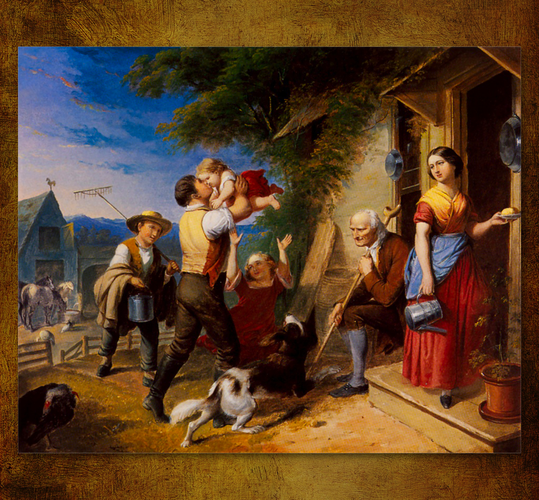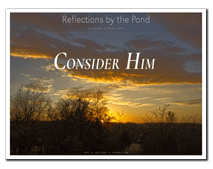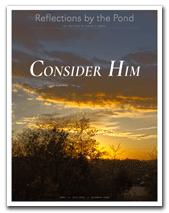Then the woman saw that the tree was good for food, and that it was a delight to the eyes,
and that the tree was desirable to make one wise,
so she took from its fruit and ate;
and she gave also to her husband with her, and he ate. (Genesis 3:6)
One comes away from the Genesis narrative about Creation and the subsequent Fall of our corporate parents with a sense of sobering awe, of an earnest fear of a holy God who demands obedience.
Perhaps the most powerful and long-lasting lesson we take away from Chapter Three of Genesis is the realization that everything we know and are—everything around and about us: about our environment and about ourselves, how we think and act, how we perceive everything around us—is at odds with what it should be, and was intended from the start.
We easily grasp that the first man and woman were utterly changed by their fall from grace because of rebellion against Yahweh God. We understand, too, from this passage and the apostle Paul, that the earth itself was altered that fateful day.
For the anxious longing of the creation eagerly waits for the revealing of the sons of God. For the creation was subjected to futility, not willingly, but because of Him who subjected it, in hope that the creation itself also will be set free from its slavery to corruption into the freedom of the glory of the children of God. For we know that the whole creation groans and suffers the pains of childbirth together until now.
Romans 8:19–22
But the result of the curse goes far beyond that: Everything in this life is not what it was supposed to be; everything is skewed away from true north. What we believe to be normal, is really not; it may be typical, but if normal is seen as God’s intention for this world from the outset, everything is abnormal.
Thus most everything in our lives that is an echo from early Creation—loving, marriage, family, raising children, working, farming—all are made more difficult than they were intended because of the Fall and the resulting Curse. In fact, every aspect of just living is made more difficult since that day in Eden. Need proof? Just go back and review all your many prayers to God for help, for healing, for mercy; all your prayers on behalf of others, for healing of cancer, heart disease, et al.
This situation is a little like comparing our “good” to God’s good; our very best, no matter how splendid in our eyes, is like filthy rags compared to His.
For all of us have become like one who is unclean,
Isaiah 64:6
And all our righteous deeds are like a filthy garment;
And all of us wither like a leaf,
And our iniquities, like the wind, carry us away.
The very best our life can be, though seemingly wonderful to us and those around us, is little more than a shadow of what it could have been absent the Fall.
For my own part I entertain no doubt that before the sin of the fall the air was more pure and healthful, the water more wholesome and fructifying, and the light of the sun more bright and beautiful. So that the whole creation as it now is reminds us in every part of the curse inflicted on it, on account of the sin of the fall.
Martin Luther
This may be hard for even believers to grasp, for we count our lives—especially in Christ—as quite good, thank you very much. The embrace of family and friends, children, grandchildren, great-grandchildren, and the communion of the saints, the fellowship of the Spirit, salvation and the hope of eternal life with our Savior—all combine for a rewarding, fulfilling life. All true. And we cannot dismiss the fact that in God’s economy there is purpose in our being here, to be salt and light in this sorry world, to share the good news of Christ, and, not least, to bring honor and glory to Him.
Layer on top of this creation itself. When we stand before the sobering grandeur of the Grand Canyon, or watch the glorious lumière of a sunset over the western hills, our first thought is not that this beautiful planet groans under the unbearable weight of sin. We who are blinded by the same fallen condition see only that which struggles to rise above creation’s “slavery to corruption,” not perceiving that absent Adam’s weakness it all would be so much better.
It is, admittedly, a thin line navigated by the follower of Christ. We are not to cling tenaciously to the delights of this world, nor are we to become unproductive slugs as we pine away for an exquisite eternity that has not yet arrived. Where should our mind and spirit dwell so as to faithfully—sober, yet hopeful—consider ourselves and all that is around us realistically? Perhaps the answer lies in how we define “eternity” itself—that believers are not waiting for their eternity, but, as followers of Christ, already dwell within it.
My guess is that most people think of the relationship between earth and heaven as reaching a point where the former ends and the latter begins. This is my life now, but at some point I will cross the threshold into my eternity. The truth, however, is that our eternity has already begun, and for the believer it is an eternity with God. Jesus stated this succinctly in some of His final moments before His death, in His high priestly prayer.
Jesus spoke these things; and lifting up His eyes to heaven, He said, “Father, the hour has come; glorify Your Son, that the Son may glorify You, even as You gave Him authority over all flesh, that to all whom You have given Him, He may give eternal life. And this is eternal life, that they may know You, the only true God, and Jesus Christ whom You have sent.”
John 17:1–3
And the apostle John expressed this same thought in his first letter.
And the witness is this, that God gave us eternal life, and this life is in His Son. He who has the Son has the life; he who does not have the Son of God does not have that life. These things I have written to you who believe in the name of the Son of God, so that you may know that you have eternal life.
1 John 5:11–13
Neither of these passages uses the future tense; everything is expressed in the present tense. Eternity with God and His Christ is not just some future hope, but is a reality in the here and now of a believer’s life—if the believer embraces it.
Consider:
Imagine someone gives you a gift of a month-long luxury cruise of the Mediterranean. It is worth many thousands of dollars. You and your spouse will be sailing on the largest, most luxurious cruise ship in the world. The amenities are without parallel. The food bountiful and sinfully delicious. On board are offered a boundless list of activities for every interest. The ports of call include such fascinating sights as Alexandria and Cairo in Egypt; the Holy Land and Petra; Istanbul; Athens, Greece; Naples and Rome, Italy; the island of Patmos; Corinth; the Isle of Crete; Monaco; Barcelona, Spain; and Morocco. All your expenses have been paid; all you need do is enjoy.
Then, upon boarding the ship, you spend the next four weeks shut in your cabin, eating from the trunk load of miserable sack lunches you brought along with you.
That is how many in the family of God live out their days—a bare-bones, Spartan existence all the while surrounded by unimaginable luxury and wealth. Our eternal life in Christ—not just heaven, but the life we are living right now—has been bought and paid for by someone else. Anything we would ever want has been supplied for us. All we have to do is enjoy.
And then we sit in our windowless rooms, nibbling on our meager dry crackers and stale cheese as we wait for heaven.
Mankind is fallen. This earth is fallen. Nothing in or around us is as it was meant to be. Beauty is a mirage seen through fallen eyes that know nothing better. The promise that there is something better dwells securely in the heart of every follower of Christ, yet He has left us here for the time being.
So what do we do? How are we to live?
We are to live out our present eternity with Him joyfully, looking forward to our promised future but not putting our life on hold until it appears. Christ Jesus is in us and with us now. Let us rejoice in His life as we take everything else as it is, acknowledging its deficiency, but being sustained by our expectation of that which will be better.
Issue #890 June 2024
Reflections by the Pond is published monthly at dlampel.com and is © 2024 David S. Lampel.
Unless otherwise indicated, all Scripture quotations taken from the (LSB®) Legacy Standard Bible®, Copyright © 2021 by The Lockman Foundation. Used by permission. All rights reserved. Managed in partnership with Three Sixteen Publishing Inc. LSBible.org and 316publishing.com. Cover painting by Tompkins Harrison Matteson (1813-1834). This and all of our resources are offered free-of-charge to the glory and praise of Christ our Lord.



